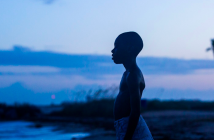
Well, that does it. La La Land is winning Best Picture.
Or is it Moonlight?
Or Loving?
How about Manchester by the Sea?
Well, for sure Emma Stone is already a Best Actress lock.
Or, hang on – it’s Ruth Negga in Loving.
But what about Natalie Portman in Jackie?
Or is it Amy Adams in Arrival?
Or hell, how about Amy Adams in Nocturnal Animals?
Yeah, we’re at that point – having made it past that first triple-barrage of Venice, Telluride, and TIFF (Fantastic Fest also came and went), and now moved directly into the second wave, as the New York Film Festival started on Friday, and London kicks off this Wednesday – where we know just enough to talk semi-intelligently about the potential trajectory of the awards season while still basically knowing nothing whatsoever. So many films yet to show themselves, so many prestige players that we won’t yet see until November or even December. But if we’re using history as our guide – and at this point in the race, history is our clearest indicator – we know that the eventual Best Picture winner may have already debuted.

It seems obvious, at least in this very early stage, that Damien Chazelle’s La La Land is, indeed, the Best Picture frontrunner. It became a sensation upon its Venice debut, where Emma Stone won the Volpi Cup for Best Actress, and continued buzzing through TIFF, where it won the increasingly auspicious People’s Choice Award. The degree to which the film (read: the campaign) can carry that mantle (read: burden) through the marathon of the season remains to be seen, but it seems likely that the film will feature prominently and consistently on the forthcoming onslaught of Top Ten lists, critics group awards, and industry guild nominations. If the film is able to nab BP – and oh, what a long way we have to go – it would be the first musical to win the big prize since Chicago in 2003. Yay, random stats.
The film’s clearest competition would have to be Moonlight, Barry Jenkins’ searing and segmented character study that tracks a young black man from youth to adulthood. In the wake of The Academy’s unmitigated diversity disaster last season, here is a film that presents a clear and forceful answer to #OscarsSoWhite: a universally-loved film that is populated from top to bottom with people of color. The sneakily problematic question that emerges, however, is this: is it middlebrow enough?
Maybe “middlebrow” isn’t the right term. I mean, it is, historically, when we’re talking about Academy taste, but in this specific circumstance, “conventional” would be a better fit. Is this purposefully episodic black story conventional enough to move the needle decidedly in its favor with AMPAS voters? Fair enough question, especially since the more conventional film that explicitly embraces diversity, The Birth of a Nation, is currently gasping for awards season air. That film’s creator, Nate Parker, is apparently attempting to strangle the life out of said hopes every time he opens his mouth, oxymoronic as that may sound. So a path is cleared for Moonlight, but one wonders if it’s “too independent” to be a winning threat.
But as the Academy looks to reverse the tide of racial myopia, there remain plenty of other diverse options, from Mira Nair’s lovely Queen of Katwe, a surprise runner-up for TIFF’s People’s Choice prize, to Denzel Washington’s Fences, which will at the very least be a showcase piece for the actor-director, and especially for Viola Davis, who will be a top Best Actress contender (assuming they don’t relegate her to the Supporting category, which is always possible as studios piece together the likeliest winning strategy). One film that just might tick off all the appropriate boxes – from the venerable embrace of diversity to the more cynical AMPAS objective of making a film that is palatable to the widest possible audience – is Jeff Nichols’ Loving. The film, a Cannes favorite that rebooted for awards season at TIFF, is everything that the Academy is chasing after both from the optics perspective – it’s a film about equality on all fronts, from racial to gender to marriage – and from an overall logistics perspective, since it’s an earnest and straightforward true story with social relevance that will be an undeniable across-the-board hit with viewers of all stripes. And Nichols – not unlike Chazelle – is a celebrated talent who may be ready to have his Oscar moment.
None of this answers the headline question of this piece. So where ARE we now? Well, we’re far enough along to see some possible trajectories, but still too far away to have any definite answers. We will see how NYFF helps shape the race as it continues, how London impacts the race in the near future, and what AFI Fest offers when it commences in early November.
It’s all happening…slowly but surely.



